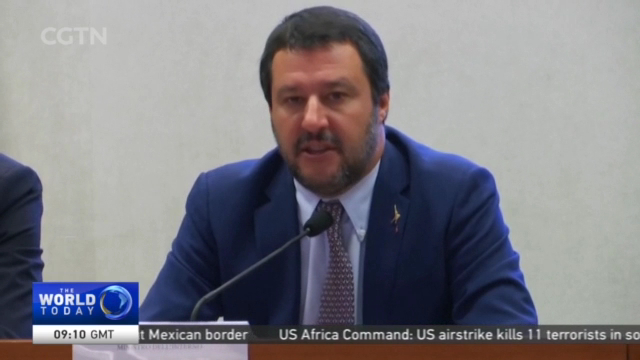
19:04, 01-Dec-2018
Italy Migration Policy: Lawmakers approve new anti-migrant law despite criticism
Updated
19:00, 04-Dec-2018
03:18

Italian lawmakers have approved a new anti-migrant and security law, despite fierce criticism from opponents. Effective immediately, the new Decree-Law clamps down on asylum rights and boosts funds for police. Natalie Carney has more from Rome.
It's being viewed as a major win for Italy's controversial interior minister Matteo Salvini.
The lower house of parliament voted 396 to 99 in favour after Italy's Senate approved the decree in early November, handing Salvini his first major legislative win.
MATTEO SALVINI ITALIAN INTERIOR MINISTER "Only those who flee war have the right to a visa for humanitarian reasons -- those who escape war, torture and persecution. The so-called economic migrants cannot have this type of recognition. And I am working like a madman, going around the world, to make those repatriation deals that those before me didn't make, either because they didn't want to or didn't know how to."
The new "Salvini decree" as it's been coined, eliminates humanitarian protection to those not tied to political persecution or war and makes it more difficult to obtain Italian citizenship. It also funnels millions of euros to law enforcement and anti-mafia administrators.
NATALIE CARNEY ROME "United nations human rights experts are urging Italy's populist government to reverse course on its tightening of immigration rules, but also acknowledging the challenges Italy faces due to the absence of an effective European-wide system of solidarity on the issue of migration."
Italy's coalition government has previously demanded that the EU resettle asylum seekers across the union and review the Dublin regulation, which states that refugees must remain in the EU country they first land.
ALBERTO CASTELVECCHI, PROFESSOR LUISS UNIVERSITY ROME "France closed their borders and the same thing was going to happen with Austria. We have a bad problem with Hungary, which despite being part of the European community is approving laws banning illegal immigration, so we Italians feel left alone and this is not good for the European affection of the Italians."
This, says Castelvecchi, has sparked more support for domestic anti-immigration policies.
In mid-November, police tore down the Baobab refugee camp on the outskirts of Rome.
CGTN visited the camp earlier this year and spoke with Roberto, the President of the Baobab Association.
ROBERTO VIVIANI PRESIDENT OF BAOBAB ASSOCIATION "What we can do as a volunteer association is to give them three meals a day and give them the legal aid they need because the bureaucracy for immigrating in Italy is very crazy and there is another association that comes here three times a week to give them the medical assistance."
This new law will dismantle all the work Baobab and other NGOs operating in Italy does, creating new forms of marginalisation and increasing the risk of conflict says the Italian Refugee Council.
Yet Salvini campaigned the new decree arguing that it would bring security back to Italy.
The number of arrivals by sea has dropped since Salvini's right wing la lega and populist five-star movement formed a coalition government earlier this year.
According to the International Organization for Migration 22 and a half thousand migrants have arrived in Italy by sea since January, a sharp drop from the 120 thousand in 2017.
Natalie Carney, CGTN, Rome, Italy.

SITEMAP
Copyright © 2018 CGTN. Beijing ICP prepared NO.16065310-3
Copyright © 2018 CGTN. Beijing ICP prepared NO.16065310-3